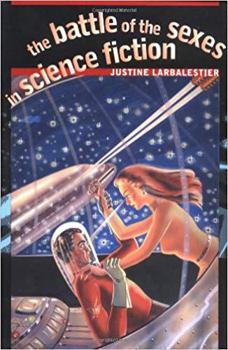The Battle of the Sexes in Science Fiction
Select Format
Select Condition 
Book Overview
How women and feminism helped to shape science fiction in America.
Runner-up for the Hugo Best Related Book Award (2003)
The Battle of the Sexes in Science Fiction is a lively account of the role of women and feminism in the development of American science fiction during its formative years, the mid-20th century. Beginning in 1926, with the publication of the first issue of Amazing Stories, Justine Larbalestier examines...
Format:Paperback
Language:English
ISBN:081956527X
ISBN13:9780819565273
Release Date:June 2002
Publisher:Wesleyan University Press
Length:424 Pages
Weight:1.25 lbs.
Dimensions:0.9" x 6.3" x 9.0"
Customer Reviews
4 ratings
Removing the Vaccuum: SF as Community
Published by Thriftbooks.com User , 17 years ago
For me, the most useful aspect of Larbalestier's book was that she insisted on viewing SF as community. Because she treated fan feedback, editorial pages and newsletters with as much gravitas as the fiction itself, her discussion of female voice, gender exploration and battle-of-the-sexes clashes is placed firmly within the larger context of the creative community. After all, literature isn't written in a void -- it's written in response and reaction to other art and the outside world. I really enjoyed the book, and I think that the Publisher's Weekly review was unfair. Sure, Larbalestier is an academic and it certain shows in her language, but she's also an SF-writer and a contributing member of the SF community, and that's who she's writing for. (And SF, after all, has always self-consciously been a community of thinkers and intelligentsia.) As a historical survey, Battle of the Sexes is a significant contribution to SF lit-crit.
A Different Perspective Of Science Fiction
Published by Thriftbooks.com User , 17 years ago
"The Battle of the Sexes in Science Fiction" by Justine Larbalestier is the fourth book in the Early Classics of Science Fiction series from Wesleyan University Press, and is unlike any of the other books in the series up to this point. The previous books in the series included whole works of science fiction along with supplementary material. This book is a study of the history of science fiction with respect to women as fans and authors. Justine Larbalestier looks at the period starting in the mid 1920's and continuing up to today. She limits her look to that period, because that is when the genre of science fiction was first identified, and because the 1920's are the starting point for the pulp magazine publications of science fiction. The book covers the portrayal of women in the stories themselves, and how poorly they were written by the male writers and how the male fans objected to the inclusion of female characters. It also covers the female fans and how their letters were treated compared with their male contemporaries. Ms. Larbalestier also talks about the women authors, how there is a perception that they didn't appear on the scene until the late 60's, and the reaction to their stories by fans, other authors, and editors. Lastly, she spends a great deal of space discussing James Tiptree Jr. (i.e. Alice Sheldon) and the award named after him/her. In the stories from the earlier days, the female characters were mostly included to be saved, or purely as a diversion from the meat of the story. The objections of the male fans to these characters thus seemed reasonable to them and the editors, but at the same time they seemed unable to accept the idea that female characters might actually be central to the stories. It is amazing to think that the idea of women as scientists or astronauts would be more unbelievable than the aliens and civilizations which were portrayed in many of the early science fiction stories. Women were clearly seen as a threat to the male dominated genre. One area which is not talked about is the effect of science fiction being dominated by the pulps and shorter fiction. She does not mention or discuss the dynamic of female characters from the few longer works from the early days. The fan letters are at the same time humorous, for how they sound today, and upsetting, for the sexist ideas which many of them contain. Some of the male fans of the time went on to become authors, such as Isaac Asimov, Ray Bradbury, and others. Equally surprising are the responses from the editors, who patronize the few female fans who take the time to write in, although I do think that Ms. Larbalestier sometimes reads more into their responses than is actually there. However, in many cases when I initially thought this, I changed my mind after trying to view the situation from another viewpoint. When discussing the presence of women authors, I can only agree with her conclusions based on my experience. I have been reading a
fun facts to know and tell
Published by Thriftbooks.com User , 21 years ago
A witty and informative book. Larbalestier's research is as deep as it is provocative. This book is a fascinating look back and Larbalestier's clean, clear prose and delightful details make it a very happy reading experience.
best book on feminist sf ever
Published by Thriftbooks.com User , 21 years ago
The book is not only well researched and insightful it's also amusing and sometimes moving. Not what you'd expect from an academic book. Larbalestier goes back to primary sources looking at - among other things - letters to science fiction magazines from the 1920s. Some are screamingly funny, some are moving - people in dust bowl towns writing about being transported to other planets by the stories. She uses material it's very difficult to get hold of opening up the field of science fiction so that it is richer and larger than you could have imagined. Guess what? Women have always been part of sf.




